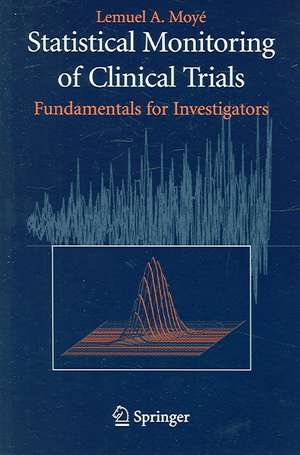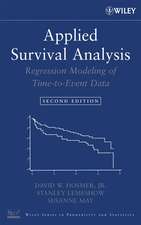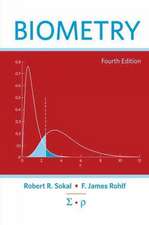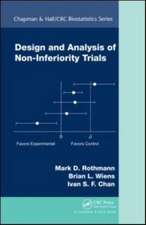Statistical Monitoring of Clinical Trials: Fundamentals for Investigators
Autor Lemuel A. Moyéen Limba Engleză Paperback – 16 noi 2005
The author provides motivated clinical investigators the background, correct use, and interpretation of these monitoring procedures at an elementary statistical level. He defines terms commonly used such as group sequential procedures and stochastic curtailment in non-mathematical language and discusses the commonly used procedures of Pocock, O’Brien–Fleming, and Lan–DeMets. He discusses the notions of conditional power, monitoring for safety and futility, and monitoring multiple endpoints in the study. The use of monitoring clinical trials is introduced in the context of the evolution of clinical research and one chapter is devoted to the more recent Bayesian procedures.
From the reviews:
"The author has a wealth of experience in this area and this is demonstrated throughout the text with relevant poignant examples." Short Book Reviews of the ISI, June 2006
Preț: 387.58 lei
Nou
Puncte Express: 581
Preț estimativ în valută:
74.17€ • 76.97$ • 61.99£
74.17€ • 76.97$ • 61.99£
Carte tipărită la comandă
Livrare economică 17-31 martie
Preluare comenzi: 021 569.72.76
Specificații
ISBN-13: 9780387277813
ISBN-10: 0387277811
Pagini: 254
Ilustrații: XXII, 254 p.
Dimensiuni: 155 x 235 x 13 mm
Greutate: 0.4 kg
Ediția:2006
Editura: Springer
Colecția Springer
Locul publicării:New York, NY, United States
ISBN-10: 0387277811
Pagini: 254
Ilustrații: XXII, 254 p.
Dimensiuni: 155 x 235 x 13 mm
Greutate: 0.4 kg
Ediția:2006
Editura: Springer
Colecția Springer
Locul publicării:New York, NY, United States
Public țintă
ResearchCuprins
Here, There be dragons….- The Basis of Statistical Reasoning in Medicine.- Probability Tools for Monitoring Rules.- Issues and Intuition in Path Analysis.- Group Sequential Analysis Procedures.- Looking Forward: Conditional Power.- Safety and Futility.- Bayesian Statistical Monitoring.
Recenzii
From the reviews:
"This book is aimed at helping clinical researchers, who have little or no quantitative background and who have difficulty in communicating with biostatisticians or experienced trial methodologists. … The author has a wealth of experience in this area and this is demonstrated throughout the text with relevant poignant examples. Each chapter has a comprehensive reference list and a set of problems … . A book to recommend for students/researchers who need to be able to apply correct use and monitor procedures for clinical investigations." (S. Starkings, Short Book Reviews, Vol. 26 (1), 2006)
"The present book is designed to provide a useful presentation of eight detailed, well written parts of statistical techniques in clinical research, a useful tool in statistical monitoring of clinical trials. In particular, the aim of the present book is to give a consistent and self-contained overview on important fundamental and modern procedures used by clinical investigators … . The book is of great interest to research workers … in the design, execution and analysis of clinical research." (Cryssoula Ganatsiou, Zentralblatt MATH, Vol. 1094 (20), 2006)
"This book is written such that it can be understood without a sophisticated mathematical background....[It] is highly recommended for clinical researchers who start to serve on a DMC, but also for healthcare graduate students and junior physician-scientists....[and] is also enjoyable reading for statisticians." (Iris Pigeot, Biometrics, December 2007)
"This book seems to be a successful attempt to introduce group sequential monitoring of clinical trials to a larger audience than well-trained statisticians working in the conduct of such trials. It is an important book that came on time and very much recommended for nonstatistician clinical investigators and members of the Data Monitoring Committees (DMCs) as well as statisticians who are not familiar with groupsequential methodologies in clinical trials. The book is self-containing and avoids mathematical complications as much as possible." (Abdulkadir Hussein, Technometrics, Vol. 50 (1), 2008)
"This book has been written to inform and help investigators understand the complex mathematical procedures and monitoring guidelines in clinical trials. … useful for researchers and investigators who would like to understand the application of statistical principles in clinical trials. I have greatly benefited by reading this book … providing a concise overview of such a diverse and complex field in a relatively simple and easy to understand format. This is a well-written book … . I strongly recommend it for all academic libraries." (Faisel Yunus, Journal of Applied Statistics, Vol. 23 (10), 2007)
"This book is aimed at helping clinical researchers, who have little or no quantitative background and who have difficulty in communicating with biostatisticians or experienced trial methodologists. … The author has a wealth of experience in this area and this is demonstrated throughout the text with relevant poignant examples. Each chapter has a comprehensive reference list and a set of problems … . A book to recommend for students/researchers who need to be able to apply correct use and monitor procedures for clinical investigations." (S. Starkings, Short Book Reviews, Vol. 26 (1), 2006)
"The present book is designed to provide a useful presentation of eight detailed, well written parts of statistical techniques in clinical research, a useful tool in statistical monitoring of clinical trials. In particular, the aim of the present book is to give a consistent and self-contained overview on important fundamental and modern procedures used by clinical investigators … . The book is of great interest to research workers … in the design, execution and analysis of clinical research." (Cryssoula Ganatsiou, Zentralblatt MATH, Vol. 1094 (20), 2006)
"This book is written such that it can be understood without a sophisticated mathematical background....[It] is highly recommended for clinical researchers who start to serve on a DMC, but also for healthcare graduate students and junior physician-scientists....[and] is also enjoyable reading for statisticians." (Iris Pigeot, Biometrics, December 2007)
"This book seems to be a successful attempt to introduce group sequential monitoring of clinical trials to a larger audience than well-trained statisticians working in the conduct of such trials. It is an important book that came on time and very much recommended for nonstatistician clinical investigators and members of the Data Monitoring Committees (DMCs) as well as statisticians who are not familiar with groupsequential methodologies in clinical trials. The book is self-containing and avoids mathematical complications as much as possible." (Abdulkadir Hussein, Technometrics, Vol. 50 (1), 2008)
"This book has been written to inform and help investigators understand the complex mathematical procedures and monitoring guidelines in clinical trials. … useful for researchers and investigators who would like to understand the application of statistical principles in clinical trials. I have greatly benefited by reading this book … providing a concise overview of such a diverse and complex field in a relatively simple and easy to understand format. This is a well-written book … . I strongly recommend it for all academic libraries." (Faisel Yunus, Journal of Applied Statistics, Vol. 23 (10), 2007)
Textul de pe ultima copertă
Statistical Monitoring of Clinical Trials: Fundamentals for Investigators introduces the investigator and statistician to monitoring procedures in clinical research. Clearly presenting the necessary background with limited use of mathematics, this book increases the knowledge, experience, and intuition of investigations in the use of these important procedures now required by the many clinical research efforts.
The author provides motivated clinical investigators the background, correct use, and interpretation of these monitoring procedures at an elementary statistical level. He defines terms commonly used such as group sequential procedures and stochastic curtailment in non-mathematical language and discusses the commonly used procedures of Pocock, O’Brien–Fleming, and Lan–DeMets. He discusses the notions of conditional power, monitoring for safety and futility, and monitoring multiple endpoints in the study. The use of monitoring clinical trials is introduced in the context of the evolution of clinical research and one chapter is devoted to the more recent Bayesian procedures.
Dr. Lemuel A. Moyé, M.D., Ph.D. is a physician and a biostatistician at the University of Texas School of Public Health. He is a diplomat of the National Board of Medical Examiners and is currently Professor of Biostatistics at the University of Texas School of Public Health in Houston where he holds a full time faculty position.
Dr. Moyé has carried out cardiovascular research for twenty years and continues to be involved in the design, execution and analysis of clinical trials, both reporting to and serving on many Data Monitoring Committees. He has served in several clinical trials sponsored by both the U.S. government and private industry. In addition, Dr. Moyé has served as statistician/epidemiologist for six years on both the Cardiovascular and Renal Drug Advisory Committee to the Food and Drug Administration and the Pharmacy Sciences AdvisoryCommittee to the FDA.
He has published over 120 manuscripts in peer-reviewed literature that discuss the design, execution and analysis of clinical research. He authored Statistical Reasoning in Medicine: The Intuitive P-value Primer (Springer, 2000) and Multiple Analysis in Clinical Trials: Fundamentals for Investigators (Springer, 2003).
The author provides motivated clinical investigators the background, correct use, and interpretation of these monitoring procedures at an elementary statistical level. He defines terms commonly used such as group sequential procedures and stochastic curtailment in non-mathematical language and discusses the commonly used procedures of Pocock, O’Brien–Fleming, and Lan–DeMets. He discusses the notions of conditional power, monitoring for safety and futility, and monitoring multiple endpoints in the study. The use of monitoring clinical trials is introduced in the context of the evolution of clinical research and one chapter is devoted to the more recent Bayesian procedures.
Dr. Lemuel A. Moyé, M.D., Ph.D. is a physician and a biostatistician at the University of Texas School of Public Health. He is a diplomat of the National Board of Medical Examiners and is currently Professor of Biostatistics at the University of Texas School of Public Health in Houston where he holds a full time faculty position.
Dr. Moyé has carried out cardiovascular research for twenty years and continues to be involved in the design, execution and analysis of clinical trials, both reporting to and serving on many Data Monitoring Committees. He has served in several clinical trials sponsored by both the U.S. government and private industry. In addition, Dr. Moyé has served as statistician/epidemiologist for six years on both the Cardiovascular and Renal Drug Advisory Committee to the Food and Drug Administration and the Pharmacy Sciences AdvisoryCommittee to the FDA.
He has published over 120 manuscripts in peer-reviewed literature that discuss the design, execution and analysis of clinical research. He authored Statistical Reasoning in Medicine: The Intuitive P-value Primer (Springer, 2000) and Multiple Analysis in Clinical Trials: Fundamentals for Investigators (Springer, 2003).
Caracteristici
Presents the basics of monitoring procedures in clinical research with limited reliance on mathematics Explores the background, correct use, and interpretation of these monitoring procedures at an elementary statistical level Devotes a chapter to newly popular Bayesian procedures An ideal survey text for clinicians without higher statistical training Includes supplementary material: sn.pub/extras















